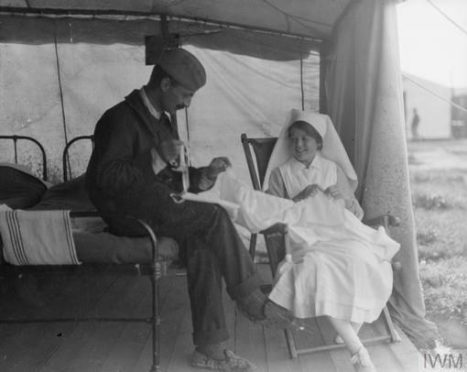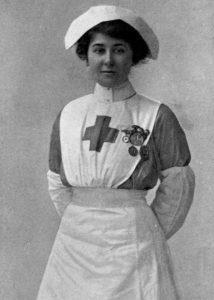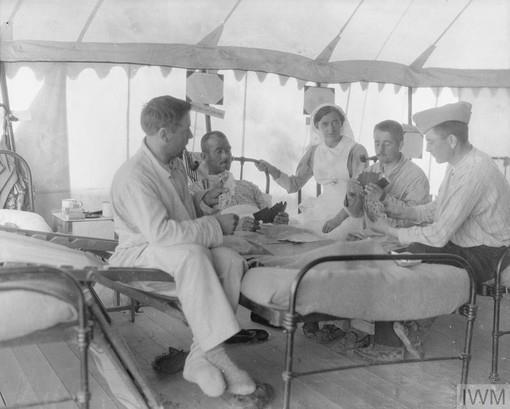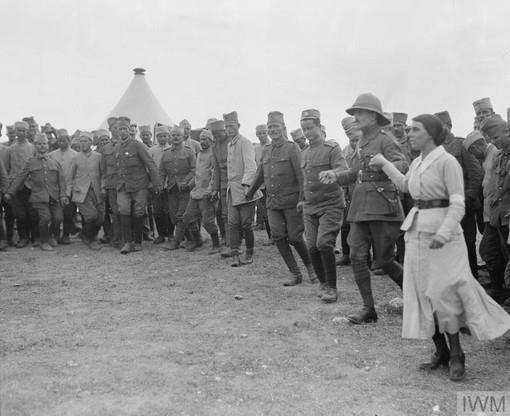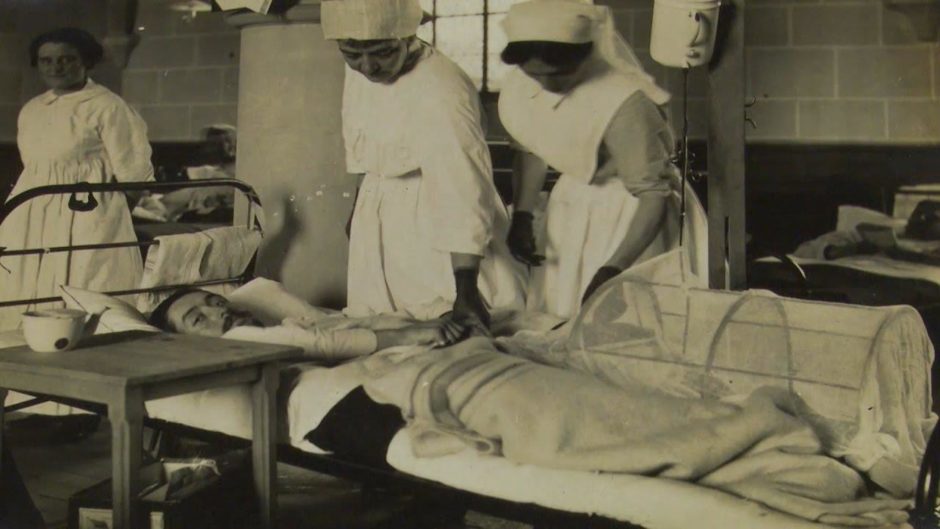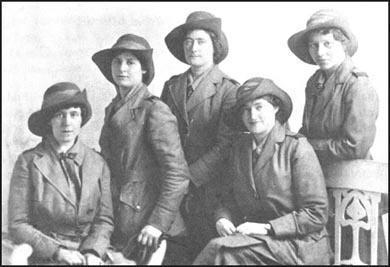It’s one of the most extraordinary stories of the First World War: the redoubtable group of Scottish women who travelled to Greece and Serbia more than 100 years ago and faced unimaginable horror.
Those who ventured into the midst of the hostilities were unfazed – or at least kept their emotions well concealed from their colleagues – by the often grisly and gruesome scenes which they encountered.
They were given the nickname of “little grey partridges” by the men they tended and the bonds between those who fought in different theatres – from France to Belgium and Romania to Serbia – were never broken.
One of them, a Skye-born woman called Ishobel Ross, kept a diary which highlighted the privations, passions and pioneering spirit of the females, led by Dr Elsie Inglis, who formed the Scottish Women’s Hospital unit, the volunteer contingent who journeyed to Salonika in the summer of 1916 and remained on the Balkan Front until the following year.
Miss Ross, who was born on the Isle of Skye in 1890 and joined the hospital ship Dunluce Castle, on her way to a nursing station in Greece, had to adapt rapidly to dealing with the best and worst of humanity amidst the conflict.
She rose to the challenge with the determination and single-mindedness which showed she came from a family of spirit. As, quite literally, she did.
Scots and Australians joined forces
Once they arrived in Salonika, they were joined by other redoubtable women, including a group of hardy Australians, marshalled by Agnes Bennett, who took part in a mission of mercy with their Scottish comrades.
Author Clive Aslet dramatised the tales of these trailblazers in his novel The Birdcage.
And, having researched the fashion in which independent women such as Miss Ross adapted to the challenge, he said he had nothing but admiration for their behaviour amidst the horrors of war.
As he said: “These women were incredibly resourceful and, though some of them thought at first they were involved in a big adventure, they soon appreciated the danger in which they were all living.
“Many of them had never been in a foreign country before in their lives, and the sea voyage was perilous, because they were at constant risk of being torpedoed. But they took these things in their stride.
The diary dealt stoically with tragedy
“Somebody such as Ishobel Ross was remarkable in how she dealt with any obstacles or tragedies which were placed in her path.
“She kept a diary – and it was published by Aberdeen University Press after her death [in 1965] – and it shows you exactly how these women went from enjoying a life of privilege to dealing with death and working in malarial conditions on a daily basis.
“They were utterly unique in WW1. They were women who created a hospital without walls, they had to carry stretchers, drive ambulances, act as surgeons and do operations on the sick in basic tents, pretty much in the middle of nowhere. And they were stationed in Salonika, which was rife with spies, rather like Casablanca in the Second World War.”
It was a far cry from her youth
The task of dealing with trauma and tristesse on the front line was a stark contrast from Miss Ross’s early life at Broadford Hotel on Skye. She was the fourth of six children and enjoyed a very happy childhood in the wild and beautiful Highland countryside with her sisters and younger brother, David.
When Ishobel was just a little girl, her father was given a scrap of paper with a French recipe on it by a friend whose ancestor had sheltered Bonnie Prince Charlie during the Jacobite Rebellion.
James Ross experimented with some ingredients from France and a special malt whisky blend and, eventually, he was satisfied with the result. He invited some of his friends to sample it and the unanimous verdict from the patrons was that it was a ‘dram buidhe’ which, in Gaelic, means a ‘golden drink’.
That very evening, he decided on a name for the liqueur and that was the beginning of Drambuie, as it is more popularly known today.
No time for cocktails in conflict
However, there were no cocktails on the menu for Miss Ross while she was in Greece. As her journal recounted in October 1916, horror abounded across the region and there were days where she had to pull herself together, hold back the tears and adopt the attitude she would do whatever it required to nurse those who needed it, including those who were in the final hours of their lives.
On one occasion, she wrote: “We had to push the ambulance through mud. There were many soldiers wounded. The funerals passed the kitchen on the way to a little graveyard on the hillside. So many of the dead were just boys.”
Another of her entries related the rigours of the work in their spartan camps.
It read: “We have Russians, Serbians and Italians wounded, but only the very, very worst cases. They are taken up to us on the backs of mules, one slung on each side of the animal in strange-looking stretchers.
“All those that can be moved further are taken down in our ambulance to the various field hospitals, and our ambulances are busy from morning to night.
“There is a poor Russian boy with both hands off and he is nearly blind. It is awful to see his suffering. The Bulgars [Bulgarians] are lying about on the hillside unburied and I am going up to bury some of them tomorrow. But it is snowing quite deep. And the cold is terrible.”
The ghastly sights in the trenches
On Valentine’s Day in 1917, Miss Ross made a visit to the trenches which left an indelible impression on her.
She said: “It was so quiet with just the sound of the wind whistling through the tangles of wire.
“What a terrible sight it was to see the bodies half buried and all the place strewn with bullets, letter cases, gas masks, empty shells and daggers. we came across a stretch of field telephone too.
“It took us ages to break up the earth with our spades because the ground was so hard, but we buried as many bodies as we could. We shall have to come back to bury more as it is very tiring work.
“On the way back, we saw a French aeroplane chasing a German one right above us. The cold is awful and it so hard to get anything like warm.
“But even though they are worn out from years of fighting, the Serbs will never give up a yard of their country. They have paid a heavy price. All over the ground are heaps of unburied soldiers and it is horrible to see the vultures above us soaring round and round and then diving down.”
The memories never left Ishobel
Her daughter, Jess Dixon, recalled how the tragedies which her mother witnessed during her wartime service, never faded with time’s passing.
She said: “As a child, I was told of my mother’s work during the war and I remember the Serbian songs she used to sing to me.
“She found a great similarity between the Serbs and the Highland people, both in appearance and temperament, and there was the same haunting sadness in much of their music.
“Her diary lay at the back of her desk until her death in 1965 and it is only in recent years that I have read the entire diary. Since then, I have fully appreciated the work done by the women in the most daunting conditions.”
Dr Inglis’ influence can’t be overstated
Miss Ross had no plans to become part of a mercy of mission in foreign climes when the Great War began in 1914.
As her daughter said: “Ishobel attended the Edinburgh Ladies College and afterwards qualified as a teacher of cookery at Atholl Crescent School of Domestic Science.
“She was now a beautiful young woman with long dark hair and blue eyes and, with her sisters, enjoyed the social life in Edinburgh.
“When the First World War started, Ishobel was teaching cookery in a girls’ school. She had met the man she would marry, Dick Mitchell, and, in her spare time, helped the Red Cross making bandages.
“Then, suddenly, her life changed course when, one evening, she went to hear Dr Elsie Inglis speaking about the Scottish Women’s Hospital’s work and about the desperate need for volunteers to go to Serbia.
“Here was a great chance for her to be of some help in the war and see something of the world beyond the Scottish border and Ishobel lost no time in volunteering for duty. She was accepted.”
And not just in her homeland, but wherever she travelled thereafter.
